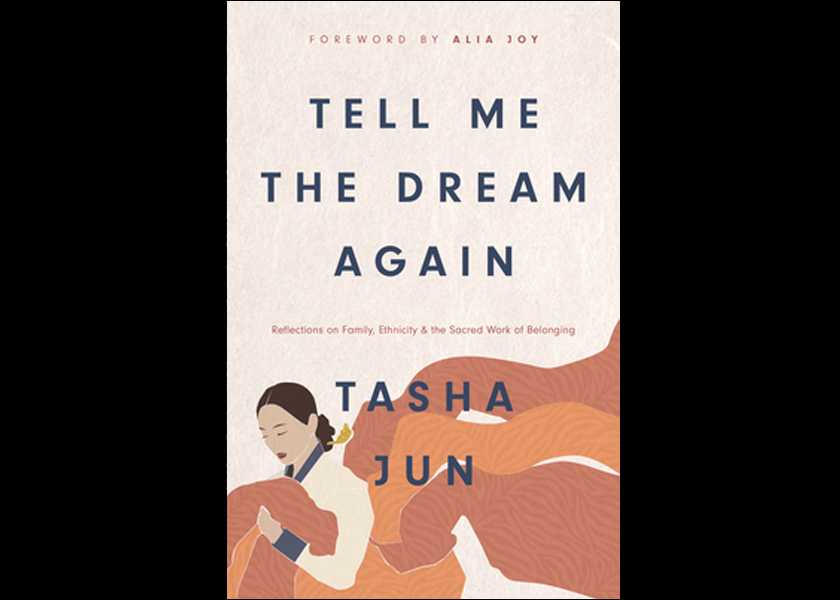Tell Me the Dream Again: Reflections on Family, Ethnicity & the Sacred Work of Belonging ~ By Tasha Jun
(Tyndale House Publishers, Carol Stream (IL), 2023, ISBN #978-1-4964-5957-2)
Review by Bill Drucker (Spring 2023)

Born of a Korean mother and white American father, Tasha Jun describes in this memoir how she learned to navigate a maze of multiculturalism as a daughter of a Korean mother and white father in the Midwest, and how she understands her identity now as an adult.
In the journey of this memoir, the author explores family traumas, secrets, losses, hopes and dreams. In coming to terms with herself and the world, Jun tells of finding her sense of belonging in the memories of her family and in her faith.
The author describes her childhood experience of being bi-racial and bi-cultural negatively – she states that she felt “unfit” as a Korean, but too Korean everywhere she went in the U.S.
As a child, the family moved a lot: From California to Wisconsin, to New York, then to Japan, then back to Santa Barbara, and then to Indiana. In white-dominated Indiana, her Korean-ness was more obvious. In her new classroom, she was the only Asian American. An onslaught of curious and insensitive questions from children followed. Was she Hawaiian, Chinese, Mexican or “what are you, anyway?”
Jun remained acutely self-conscious of her biracial identity during her school years. The Korean-ness she thought of as normal in her family felt like an embarrassment at school. As a result, she struggled to accept who she was.
Her well-meaning parents didn’t help. If she was bullied in school, she did not bring up the subject at home. Instead, she began to blame herself. Even with her Korean mother, she felt out of place in a Korean market. In Korea, the children spit at her.
Rather than having to confront the race issue, Jun tried to fade into the background. Her ethnicity, whether she denied it or not, was significant to her life and relationships. It became a puzzle to solve in stages as she grew up. When she met her future husband Matt, Jun was surprised that her Asian-ness wasn’t what attracted him to her. It was still a bumpy ride as they tried to understand each other.
The author described how her mother, Jeong, had faced similar racial issues with her husband’s parents. Her mother’s story was that her new in-laws initially stared at her, before eventually sitting down to a potato-chip-covered casserole.
Jun grew up with her mother’s Korean cooking and her mother’s stories and dreams, which included tales of tigers in Korea. Jeong’s history included being a war refugee (when she was five, the the Korean War broke out), the division of the country, the loss of her parents, and leaving her homeland. The author sensed her mother’s reticence to speak of the trauma of those times. She found the gaps and untold stories to be frustrating. To the author, her mother’s life was another puzzle with missing pieces and missing family members that her mother was forced to separate from forever.
When her mother revealed certain isolated facts, for example, that Jun had an older sister from another relationship, the lack of context made it difficult for Jun to understand the whole picture. However, the two sisters did eventually meet and form a relationship.
Church was part of Jun’s upbringing, due to the influence of parents and her paternal (white) grandmother. The author describes how discovering her relationship with her God was marred by the bias of western Christian values – what should a fair-skinned, blue-eyed Savior mean to an Asian American girl? She was often the only Asian person at a church service.
After college, Jun did ministry work in Germany for two years, which provided a new path for her spiritual journey. During that time, she connected to other groups, including Asian women. The COVID-19 lockdown also provided Jun with opportunities to engage with other Asian women through internet, social media and video chats. Anti-Asian hate was on the rise, and there was a lot going on to discuss and process. The 2021 hate crime shooting spree in Atlanta that killed eight Asian people was a violent reminder.
In her narrative, the author uses specific terms of cultural, psychological, and spiritual significance. The Latin term, imago dei or the image of God, refers to how God created humans in God’s image, which further specifies the relationship of God and humans. Shalom (peace, also wholeness or completeness), in a more fundamental sense, means reconciliation with God. The author adds the term shalomsick to suggest the desire for peace and reconciliation. She also mentions the Korean terms han (suppressed feelings of sorrow, anger, grief, and regret), and its counterpart jeong (strong emotional bonds to people and places).
This memoir will register with any reader who has experienced social and cultural struggles. The author sensitively describes the complexity of family relationships that involve the larger societal issues of multiculturalism, racism, identity and belonging. She also expresses how some ideas that were obtuse in her childhood have taken on meaning as she has matured and become a mother with her own children in a multicultural home.
Jun comments on how her children ask for tteokguk or rice cake soup, a dish she ate as a child and learned to cook from her mother. The family traditions live on.
Jun has written for (in)Courage Monthly, Relevant, The Mudroom, PAX, SheLoves Magazine, Everyday Faith, Think Christian and other publications. She lives in Indianapolis with her husband Matt and their three children. Tell Me the Dream Again is her debut book.


